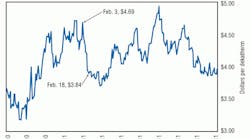Reducing energy consumption can be hugely beneficial to a facility's bottom line, but the second most direct route to decreasing energy costs is to manage the energy purchase itself. No single energy-procurement plan works for all companies. Business managers need to be aware of their options to make energy-purchasing decisions that will positively affect their bottom line.
Decisions, Decisions
Three main energy-procurement choices exist for all energy consumers. Business managers, engineering departments, and facility managers should be aware of the pros and cons of each so they can choose what's best for them.
Individually buying energy on the open market is one possibility. It can be intimidating, and rightfully so for someone who doesn’t have years of energy-industry experience. Deregulated energy markets are volatile and tough to interpret. That doesn't mean an individual acting as his or her own purchasing agent can’t make a good decision. With energy prices changing literally by the minute, however, it can be a daunting process—especially if the buyer has other responsibilities vying for his or her time.
Another option is to join an energy aggregation group. Although not the best direction for many manufacturers or businesses, conditions exist where joining an aggregation group can be beneficial.
Aggregation groups limit mobility and minute-to-minute purchasing power, reducing some market agility, but there are benefits. An aggregation group removes much of the guesswork and hassle from the purchasing process, very similar to the way mutual funds separate buyers from all of the day-to-day stock and bond decisions. Although rock-bottom prices rarely are seen by purchasing with an aggregation group, this means of procuring energy can be a safe bet. For business managers, it's "out of sight, out of mind."
The third option is hiring an individual energy consultant to manage the entire energy-procurement process. An energy-procurement specialist purchasing for only one firm at a time has the mobility needed to navigate violently fluctuating energy markets.
If the consultant is doing his or her job properly (so you need to choose well here, too, by asking questions and seeking referrals), he or she won’t rush you into buying energy. With the natural-gas and electricity markets being two of the most volatile in the world, it pays to be patient and deliberate and truly understand the factors that affect the markets. Be prepared to act on short notice to take advantage of attractive long- and short-term market opportunities.
Price to Compare
No matter which of the three purchasing venues you choose, understanding the price to compare (PTC) will make the process as transparent as it can be. Aggregators or consultants may tout the fact that they can lock in an energy price below the utility's PTC. While this may be true, just beating the PTC should not be the ultimate goal. The PTC is simply the utility’s posted energy cost for the next quarter. Projected volume, future market prices, and a “true-up” from the preceding quarter are the main considerations utility managers review prior to adjusting a quarterly PTC.
Given appropriate timing, anyone can purchase energy at a price below the utility PTC. In fact, being versatile and familiar with daily market fluctuations and future trends often can result in purchases far below the PTC. But for this to happen, buyers need to take an educated position and be prepared to respond to market opportunities on short notice.
Figure 1 is the daily current month settle for natural gas over the past year. On Feb. 3, 2011, the current month settled at $4.69 per dekatherm. Two weeks later, that same month settled down 85 cents per dekatherm at $3.84/dekatherm. If your requirements for that month were 10,000 dekatherms, monitoring the market closely over those two weeks would have added $8,500 to your bottom line.
If Customer 1 bought natural gas on Feb. 3rd and Customer 2 bought natural gas on Feb. 18, Customer 2 would save 85 cents per dekatherm. Timing, not volume, will dictate the price no matter how large or small the account.
On Aggregation Groups
When considering joining an aggregation group, be aware that some members in the group can benefit at the expense of others. Cross-company subsidizing occurs when both flat-load (steady use) customers and peaking-load (fluctuating use) customers are grouped together. Because all of the members of some aggregation groups are given the same price, it will no doubt be unfair to some.
The same applies to geographic location, as the distance from an energy source will play a large part in determining an energy price. A customer located in close proximity to the energy source will subsidize a client located many miles away.
Additionally, a widespread misconception is that when numerous companies buy energy together, they receive a bulk discount. This isn’t the case. There is no bulk discount, only a delivery discount. Because the businesses have different physical addresses, the discount doesn’t apply.
Choose Consultants Carefully
If an individual consultant looks like the best option for your firm, care should be taken to choose the correct one. Not all consultants bring the same experience and business ethics to the table. Build a working relationship with your consultant to be sure you can stake your reputation on his or her qualifications. The right partnership should be mutually beneficial.
Consultants' loyalty should be to an individual client rather than a supplier or an aggregator, and they should bring a personalized and independent perspective to an energy buyer’s needs and goals. Protecting their clients’ bottom lines should be their primary goal.
Tod W. Sherman is president and CEO of Tybec Energy Management Specialists Inc. He has more than 15 years of energy-industry experience. He graduated from The Pennsylvania State University with a bachelor’s degree in civil engineering. Prior to founding Tybec with partners Doug Snyder (CFO) and Mark Sahd (COO), he worked in the regulated energy industry for UGI Utilities Inc. as an industrial and commercial sales representative and a distribution engineer. He also worked as a resident engineer in construction management, as well as a consulting civil engineer in Pennsylvania and Alaska.









